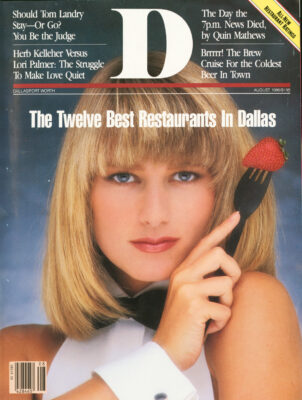Many ordinarily self-confident adults agonize over how to do it right.
Some people are philosophically opposed to it, while their counterparts believe it is necessary and good.
The Internal Revenue Service has cracked down on the reporting of income derived from it.
People who have depended on it in the past are generous about it now.
In Europe, it isn’t an issue.
Tipping in restaurants. It’s a perplexing business, even to restaurant critics, as an informal survey reveals:
●John Mariani, editor of Mariani’s Coast-to-Coast Dining Guide, says: “The standardtip used to be and still is 15 percent. I knowa lot of lavish tippers who tip 20 percent forgood or bad service. In New York, I’d say 20percent is the rule, not the exception. Andthe higher priced the restaurant, the moreone is expected to tip, which is silly.
“What I am amazed by is the number of sophisticated people who ask me the same thing: ’I always screw this up, what should I tip?’ It’s simple: for a modicum of pleasant service, 15 percent; for a helpful, generous attitude, 20 percent; for poor service, 10 percent. For really nasty service, leave nothing, even-or especially-if the waiter is standing there staring as you fill out the American Express form.
“A lot of people tip no matter what. We all want to be loved, right? People think, ’If I don’t leave a good tip, this guy will immediately see it and glare at me. He might even say something.’ I have to admit that when I leave a low tip, I usher myself out the door posthaste.”
●Seymour Britchky writes in The Restaurants of New York: “Par is 15 percent of thebefore-tax food total, plus some lesserpercentage of the liquor and wine. If you areserved by both a waiter and a captain, 20percent is fair, proportion depending onwhether the captain did no more than cursorily take your order or if, at the other extreme, he thoroughly explained the menu,prepared sauces and desserts, and helpedwith the selection of wine.
“Reasons for tipping more: you ate the least expensive items on the menu and occupied the table for three hours; the service was terrific; you are feeling expansive.
“Reasons for tipping less: the reverse of the above, except that waiters should not be penalized for your depression unless it is their fault.
“Sommeliers should be tipped $2 per bottle, but no less than $3 in total if they have been really helpful.”
● Ruth Reichi, restaurant editor of the LosAngeles Times, says: “I’m of two mindsabout tipping. On the one hand, I approve ofthe system at Michael’s, a restaurant in Santa Monica. Originally, the waiters were asked to give a certain percentage of their tips to the kitchen. One of the waiters went to the National Labor Relations Board, which ruled that tips belong to waiters. Michael McCar-ty, the owner, decided that because nobody comes to a restaurant for the great service, it’s unfair that waiters work for four or five hours and waltz out with $200. So he instituted a service charge and put everybody on salary at $15 an hour. As a result, most of the waiters quit. I think it says something that you can’t find waiters who will work for $15 an hour.
“On the other hand, I nearly always tip 20 percent in restaurants, if only because I’ve been a waitress. In the last couple of years, I’ve noticed a lot of people in California tipping 20 percent instead of 15 percent. I think it’s guilt: you’re already spending so much money that you think, ’What’s another $5?’ “
●Colman Andrews, a contributing editorto Metropolitan Home, says: “Lots of people complain about tipping, but it’s just partof the expense of going out to dinner. If youcan’t afford to tip, you can’t afford the restaurant. I’m always amazed at how little peopletip. A tip is leverage for being rememberedin the future.
“For me, the standard tip is 15 percent of the total, including the tax. I tip 20 percent at a few restaurants where I go regularly. As for subtracting the tax first, that to me is petty. I figure the extra dollar means more to the waiter.
“The IRS passed a law in 1982 taxing waiters on a basis of 8 percent of a restaurant’s gross revenues. A lot of waiters say they don’t average that much, and I believe them. You have to remember that customers penalize the waiter when it’s not his fault. People don’t like to complain to the owner; the easiest way to issue a complaint is to stiff the waiter.
“Sure, there are some waiters who make a lot of money, but that doesn’t mean they don’t deserve it. In general, it’s a tough job. You have to put up with a lot of weird stuff.”
●Denver Post restaurant critic MichaelCarlton says: “I prefer the American systemof tipping. The standard of service is betterwhen the waiter is expecting a tip and working to earn it, rather than knowing he’s goingto get it regardless, as is the case in Europeanrestaurants.
“People in Denver are sometimes reluctant to tip even 15 percent. Personally, I tip between 15 and 20 percent, although not for bad service. In that case, I leave a dollar or something so they won’t think I forgot.”
●Kansas City Star restaurant critic ArtSiemering says: “There is a division ofopinion concerning tipping that will never beresolved. Some people simply refuse to participate, meaning they just don’t tip. I’venever gauged how large a group this is, butI think people might be surprised. The normis definitely 15, as opposed to 20, percent inKansas City. For rude service, I go to zero.But for merely inept service, I only go downto 10 percent.”
● Bryan Miller, restaurant critic of The New York Times, says: “Life is certainly easier in Europe, where there are service charges instead of tipping. But I think the tipping system is pretty effective in this country. It’s your basic capitalist philosophy: put yourself out and do extra work for extra reward.
“Having been a waiter, I’m a generous tipper. Even for bad service, I leave 15 percent. I look at it as part of their salary, not a gratuity. Of course, with inflation, restaurants are so expensive that 15 percent becomes quite a hefty total.
“If people are really nice, not even necessarily technically proficient, I tip between 15 and 20 percent. Congeniality is such a rare commodity that I think it deserves something. And if I’m euphoric, I might go over 20 percent. However, if a waiter is extremely rude, I’ll leave 10 percent. Once, I left nothing, and the waiter chased me into the street.”
●Serena Jutkoyitz, a San Francisco-based food critic, writes: “Tipping is surely the prime cause of tension between staff members and restaurant guests, among staff members, and within groups of diners. It’s a nasty practice I wish would disappear. My only comments are these: bad service merits a bad tip. Period. If you fear being considered a cheapskate rather than someone unwilling to reward bad behavior, put a note on the check or charge slip saying “incompetent” (or “rude”) “service.” If you don’t wish to penalize those persons who were helpful, tip them-busser, sommelier, host-separately. The time to overtip, if ever, is in small, inexpensive restaurants, where waiters are more likely to work long hours for little recompense. I usually tip a bit more if I brought wine and the corkage was low; otherwise, I tend to tip a somewhat lower percentage on an expensive bottle of wine than on the food portion of the bill, particularly if it didn’t require decanting or we ended up pouring our own (something I certainly don’t mind doing but which on occasion elicits a reproach from a waiter who was derelict in his duty). I hope it’s clear that I’m suggesting that a tip-so long as this archaic and demeaning custom remains-should be creative and thoughtful, not just a reflex.”
●Social critic Alexander Cockburn writes: “A tip can be a commodious expression of confidence in a seasoned relationship. French waiters understand this. ’Thank you, Monsieur X’; in some of the more old-fashioned French restaurants in New York one can hear that pleased cry, nuanced with deferential intimacy, as if to say ’Monsieur is a man of the world, a man of generosity, a man who understands how to comport himself.’ It is in the same idiom as the old-fashioned French maitre d’hotel who, with the inflection he gives ’Your table Monsieur,’ similarly expresses a recognition of Monsieur’s fine standing in the world and Monsieur’s fine and delicate generosity too.
“But far more often one can witness the tip articulated in the syntax of contempt or rage. At a smart restaurant in lower Manhattan not so long ago I saw a waiter pursue to the door a man who was leaving with a large party and, after a brief discussion, the man gave the waiter money, with every appearance of embarrassment and shame. A member of his party whom I knew told me the next day that his host at that restaurant had been an Englishman who had left a 10 percent tip. When the waiter caught up with him at the door he said, ’Excuse me, sir, was there something unsatisfactory with the service?’ ’Not at all.’ ’It is customary in this country, sir, to leave a tip of 15 or 20 percent.’ At which point the Englishman could have made some remark about impertinent mendicancy, but, in fact, he cringed and ended up giving the waiter about 30 percent of the bill.
“Tipping is a paradox: formal yet informal, public yet private, commercial yet intimate, voluntary yet in reality so close tocompulsory that most people, across theyears, have little difficulty in rememberingthe times they felt compelled to leave no tipat all. If tipping becomes an entirely mechanical act, beneath government supervision, it loses its vitality and provokes the dullresentment one experiences at the sight ofthe words, A 15 percent service charge is included in the price of the meal.’ Even if it isonly a matter of a few cents or a few dollarsthere must always be room for maneuver, forindividual expression.”
Get our weekly recap
Brings new meaning to the phrase Sunday Funday. No spam, ever.
Related Articles

Business
Wicked Bold Chocolate CEO and Comedian Deric Cahill on Why it Pays to Be Funny
The brand leans into humor, but the business' success is no laughing matter, with products in nearly 2,000 retail locations nationwide.
By Will Maddox

D CEO Award Programs
Nominations Open: D CEO’s 2024 Corporate Counsel Awards
The annual program honors top in-house attorneys in Dallas-Fort Worth, from outstanding up-and-comer to outstanding general counsel.

Media
5 Things to Know About ‘Why It Matters’ That Our Mayor Lies
Or: why does the Dallas Morning News treat readers like children?
By Tim Rogers


